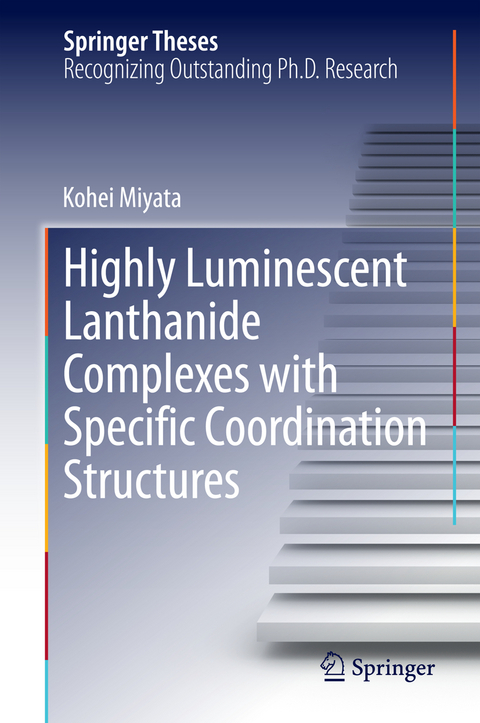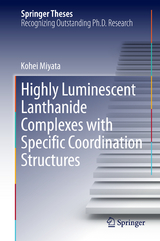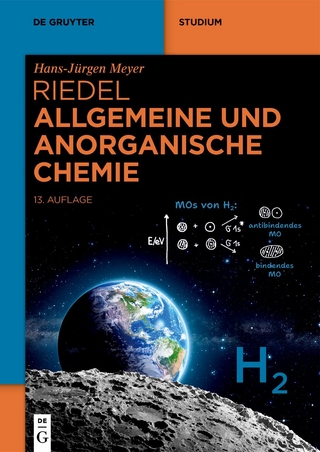Highly Luminescent Lanthanide Complexes with Specific Coordination Structures
Seiten
This thesis deals with strongly luminescent lanthanide complexes having novel coordination structures. In this thesis, the luminescent properties of lanthanide complexes with low-vibrational frequency C–F and P=O units are elucidated in terms of geometrical, vibrational, and chemical structures.
This thesis deals with strongly luminescent lanthanide complexes having novel coordination structures. Luminescent lanthanide complexes are promising candidates as active materials for EL devices, lasers, and bio-sensing applications. The organic ligands in lanthanide complexes control geometrical and vibrational frequency structures that are closely related to the luminescent properties. In most of the previous work, however, lanthanide complexes have high-vibrational frequency C–H units close to the metal center for radiationless transition. In this thesis, the luminescent properties of lanthanide complexes with low-vibrational frequency C–F and P=O units are elucidated in terms of geometrical, vibrational, and chemical structures. The author also describes lanthanide coordination polymers with both high thermal stability (decomposition point > 300°C) and strong-luminescent properties (emission quantum yield > 80%). The author believes that novel studies on the characteristic structures and photophysical properties of lanthanide complexes may open up a frontier field in photophysical, coordination and material chemistry.
This thesis deals with strongly luminescent lanthanide complexes having novel coordination structures. Luminescent lanthanide complexes are promising candidates as active materials for EL devices, lasers, and bio-sensing applications. The organic ligands in lanthanide complexes control geometrical and vibrational frequency structures that are closely related to the luminescent properties. In most of the previous work, however, lanthanide complexes have high-vibrational frequency C–H units close to the metal center for radiationless transition. In this thesis, the luminescent properties of lanthanide complexes with low-vibrational frequency C–F and P=O units are elucidated in terms of geometrical, vibrational, and chemical structures. The author also describes lanthanide coordination polymers with both high thermal stability (decomposition point > 300°C) and strong-luminescent properties (emission quantum yield > 80%). The author believes that novel studies on the characteristic structures and photophysical properties of lanthanide complexes may open up a frontier field in photophysical, coordination and material chemistry.
General Introduction.- Luminescence Properties of Thermostable Lanthanide Coordination Polymers with Intermolecular Interactions.- Chameleon Luminophore for a Wide Range Temperature-Sensor Composed of Lanthanide Coordination Polymers.- Characteristic Structures and Photophysical Properties of Nona-coordinated Eu(III) Complexes with Tridentate Phosphine Oxides.- Photophysical Properties of Lanthanide Complexes with Asymmetric Dodecahedron Structures.- Solvent-dependent Luminescence of Octa-coordinated Eu(III) Complexes.- Summary.
| Reihe/Serie | Springer Theses |
|---|---|
| Zusatzinfo | 21 Illustrations, color; 31 Illustrations, black and white; XIII, 91 p. 52 illus., 21 illus. in color. |
| Verlagsort | Tokyo |
| Sprache | englisch |
| Maße | 155 x 235 mm |
| Themenwelt | Naturwissenschaften ► Chemie ► Anorganische Chemie |
| Naturwissenschaften ► Chemie ► Physikalische Chemie | |
| Technik ► Elektrotechnik / Energietechnik | |
| Technik ► Maschinenbau | |
| Schlagworte | Coordination Structure • Lanthanide • Lanthanide Complex • Luminescence of Complexes • Phosphine Oxide |
| ISBN-10 | 4-431-54943-9 / 4431549439 |
| ISBN-13 | 978-4-431-54943-7 / 9784431549437 |
| Zustand | Neuware |
| Informationen gemäß Produktsicherheitsverordnung (GPSR) | |
| Haben Sie eine Frage zum Produkt? |
Mehr entdecken
aus dem Bereich
aus dem Bereich




